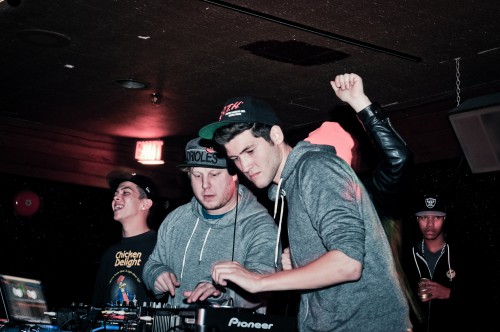 ELECTRONIC TRAP PRODUCER BAAUER MIXES live at a concert.
ELECTRONIC TRAP PRODUCER BAAUER MIXES live at a concert.How could someone possibly follow up the Harlem Shake? We all remember that flash-in-the-pan internet meme. The first 20 seconds or so of the song “Harlem Shake” played, while one person danced in the midst of others doing regular activities. At the first drop, the previously uninteresting bystanders would begin dancing in ridiculous costumes and movements. Thousands upon thousands of people uploaded their version of the trend onto YouTube. At its peak in early February 2013, over 4,000 Harlem Shake videos were uploaded daily. As a result, the song peaked at No. 1 on the Billboard Hot 100. In fact, the unexpected success of Harlem Shake prompted a change in how they consider online streams for their rankings.
The musical mind behind the Harlem Shake, Baauer, is probably trying to escape this huge internet sensation. The infamous label of “one-hit-wonder” is one that artists desperately try to elude. But the hit of the Harlem Shake is a tough one to outshine. To face this mighty challenge, Baauer finally released his first full length project on March 18th, titled Aa. The structure of this LP was certainly intentional to showcase what he is capable of. The first five tracks are all solo projects, with no features to be seen. Then, the bottom half of the album is riddled with an extremely wide range of features; these stretch from mainstream artists like Pusha T to relatively unheard of vocalists such as Leikeli47. It’s as if he’s conveying his individual prowess first, before showing off his aptitude for collaboration.
The finest part of this split is how Baauer manages to produce great tracks on both sides. The solo works such as “GoGo!” and “Sow” are absolute bangers. They hit hard with perfectly constructed basslines, captivating samples, and complex drum harmonies. The joint efforts are highlighted by “Day Ones (feat. Novelist & Leikeli47)” and “Kung Fu (feat. Pusha T & Future)”. The fearsome verse by Leikeli47 is nothing short of badass. The intimidating production by Baauer needed swagger similar to Beyonce’s vocals to truly pull off. Leikeli47 delivers, and she perhaps even steals the show. Also, Pusha T’s “drug kingpin” boasts and Future’s “dance floor” bars fit the ominous production very well.
The negatives of the album are few, but unfortunately significant. Although there was a lot to like in the songs I’ve mentioned, there wasn’t much else for Aa to offer. Three of the songs I’ve discussed were released as singles prior to the LP release date. The actual album drop seemed to fall flat. With just 13 songs, and four of those being within the “intro/outro/interlude” family, we are left wanting more. I would have loved to hear some of the shorter tracks truly fleshed out. Also, the production value is certainly to-notch and unique, but it’s almost as if the album is a collection of singles rather than a cohesive idea.
Baauer’s seeming trepidation to venture deeper into his sound kept Aa far from “game changer” and more towards “pretty good.” However, banging 808 basslines and catchy, chopped up samples showcase Baauer’s abilities. With the album finishing at the 33-minute mark, it’s a speeding drive through what he has to offer, but it’s certainly an enjoyable ride.
